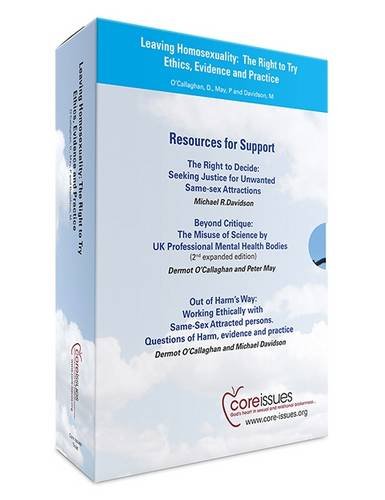Articoli correlati a Leaving Homosexuality: The Right to Try: Ethics, Evidence...

In "The Right to Decide", (Davidson 2012) the right of individuals to seek professional help for reducing unwanted same sex attractions, through assistance from psychological and psychotherapeutic professionals, is upheld. Thus a married man wanting help to reduce these feelings, in favour of remaining in his marriage, may not be helped in his goals. Proponents of these measures, along with the advocates for gay marriage, often appeal to the personal accounts of individuals denied the right to identify as gay and to live as homosexuals. This booklet contributes to the debate by highlighting a range of circumstances, evidenced in the lives of the individual contributors, where it is appropriate that professional help is accessed to achieve the personal goal of walking away from homosexual practice and feelings. In "Beyond Critique" (Ocallaghan, D and May, P., 2nd Edition) O'Callaghan is concerned about the research data of the Royal College of Psychiatrists' submission to the Church of England's 'Listening Exercise' on human sexuality have been expanded by an additional contributor. Dr Peter May addresses the College's submission to the Government's Consultation on Equal Civil Marriage, which recommends same-sex marriage as a Public Health strategy. However, the evidential basis for this is greatly overblown, while wider public health issues are ignored, concerning both same-sex partnering and parenting. The authors accuse the College of misleading both Church and State by using bad science to propagate gay ideology. In the third booklet, the fact that any therapist in the UK offering to help a client to reduce unwanted same-sex attraction can now expect to be struck off the register of their professional body, is considered. Why should this be? The primary reason is that all therapies geared to such a goal are now alleged to be 'harmful'. Why should therapy for this one condition - unwanted same-sex attraction - be singled out as being unethical? Could it be a matter of ideology rather than science? O'Callaghan and Davidson investigate issues of harm, the attendant ethical considerations, the use of evidence in assessing these questions and several practice issues in working ethically with this group.
Le informazioni nella sezione "Riassunto" possono far riferimento a edizioni diverse di questo titolo.
- EditoreCore Issues Trust
- Data di pubblicazione2013
- ISBN 10 0992638003
- ISBN 13 9780992638009
- RilegaturaCopertina flessibile
Compra usato
Condizioni: buonoMost items will be dispatched the... Scopri di più su questo articolo
EUR 7,93
Spese di spedizione:
EUR 9,29
Da: Regno Unito a: U.S.A.
I migliori risultati di ricerca su AbeBooks
Leaving Homosexuality: The Right to Try: Ethics, Evidence and Practice
Editore:
Core Issues Trust
(2013)
ISBN 10: 0992638003
ISBN 13: 9780992638009
Antico o usato
Brossura
Quantità: 1
Da:
Valutazione libreria
Descrizione libro Condizione: Good. Most items will be dispatched the same or the next working day. Codice articolo wbb0023451089
Compra usato
EUR 7,93
Convertire valuta

